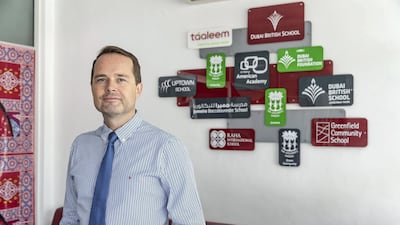Schools in the UAE are finding it difficult to recruit maths, science and technology teachers because of more lucrative offers for specialists in these sectors, education institutions have said.
With graduates in technology, science and chemistry in high demand across the employment market, the heads of UAE schools have said that recruiting has become a challenge.
A new interim report published by the Council of British International Schools, Teacher Supply in British International Schools, found the UK to be facing a severe shortage of teachers as fewer graduates opt for the vocation while trained teachers are quitting the profession.
Dubai has 73 British schools, with about one in three schoolchildren studying the UK curriculum.
Brendon Fulton, the principal of Dubai British School, said: “We are finding in the UK that many people who have degrees in [maths and science] are moving into different industries. Graduates who have left university with degrees in physics or chemistry are looking for more lucrative opportunities.
“The majority of our teachers come from the UK and there is a sense of disenchantment with the system of education there. They are disillusioned with the quality of schools, lack of support and remuneration.”
In the hope of retaining educators, some schools in the Emirates are choosing to train their teachers in UK qualifications, while others are offering them open-ended contracts and, like Mr Fulton's school, diversification programmes.
Chemistry is 'particularly difficult'
Simon Corns, headmaster at Brighton College Abu Dhabi, said he has noticed a shortage of job applications for particular subjects.
“Finding teachers for chemistry is particularly difficult,” he said.
“We are moving to open-ended contracts, which I am hoping will encourage people not to think in terms of their next move. When people come on a two-year contract, after one year they are already thinking of applying elsewhere.”
Offering teachers flexibility is one possible solution, according to the headmaster.
Clive Pierrepont, director of communications at education provider Taaleem, pointed out that there has been rapid recent growth in overseas British schools that has fuelled the demand for British teachers.
According to The International Schools Consultancy, there were 2,584 English medium schools in 2000 and in 2017 that had risen to 8,924. In a decade’s time, they predict that number will reach 16,600. The UAE has 601 international schools, second only to China, which has 638.
“The challenges are not as acute as in other Gulf countries. The UAE has a global reputation as a ‘destination of choice’ – it is safe and offers an attractive lifestyle for many educators looking to relocate abroad. The schools that find it difficult to retain teachers are often those newly established ones that are built by sole operators and offer little professional development, career progression prospects and lack experienced leadership,” he said.
The Cobis report found that 94 per cent of British international school leaders now find recruiting quality teachers "somewhat" or "very" challenging.
“The newly announced visa rules that will enable educators and their extended families to reside and study here, the 100 per cent foreign ownership of companies and the affordability of property will almost certainly make educators more inclined to plan a long-term future here,” said Mr Pierrepont.
Train in the UAE
Russell Smart, assistant head teacher at Kings' School Al Barsha, said that in the past few years, the teaching profession in UK has faced "a lot of difficulties and the knock-on effect has been that we have had difficulties getting teachers from the UK”.
The school is exploring links with UK universities that have a footing in the UAE so graduates can qualify as teachers in the UAE.
“This will help us as we would have trained them in our pedagogy and our way of thought. The teachers will be doing their training at the school and the theory training will be at the Dubai-based university,” he said.
_________
Read more:
UAE schools should offer teachers job security and career progession to retain staff
Foreign teachers in big demand at UAE schools
________
The school’s steps are in line with the report’s recommendations.
Cobis is proposing an approach where teaching is positioned as an international career option. It has also suggested increasing international training opportunities and valuing overseas service.
Judith Finnemore at Focal Point Management Consultancy believes the problem with recruiting teachers is “across the board and across the whole country”.
“Recruitment is actually extremely difficult for the UAE at the moment. Schools are finding it difficult to get people to move anywhere globally. A lot of it is to with uncertainty,” said Ms Finnemore.
“One is the uncertainty of Brexit. The British pound is extremely strong at the moment and when people go to remit their salaries to the UK, they are losing a lot of money.”
There are currently more than 4,300 British international schools operating worldwide, representing 45 per cent of the international schools market. They are a leading export, valued at more than £1 billion (Dh4.87bn).


